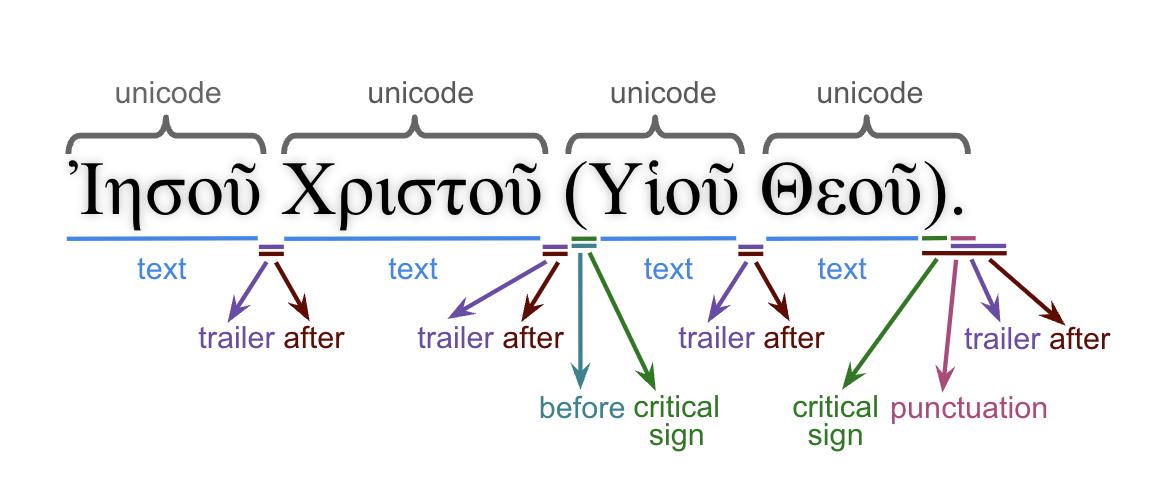N1904-TF

Text-Fabric dataset of the Greek New Testament, based on the Nestle 1904 (7th printing) edition.
About this datasetTranscription
Featureset
Optional features
Viewtypes
Textformats
Syntaxtrees
Tutorial
Latest release
Nestle 1904 GNT - Feature: translit
| Feature group | Feature type | Data type | Available for node types | Used by viewtype |
|---|---|---|---|---|
Orthograpic |
Node |
String |
word subphrase phrase |
syntax-view wg-view |
Feature description
The translit feature provides a transliteration of Greek word surface text into Latin characters. This feature is useful for users who prefer or require Latin script for writing queries or studying the text.
This feature is also populated for phrase or subphrase, but only if they consist of just one word node.
Feature values
The following tables show the top five entries with the highest frequency for different node types.
For word nodes (used in syntax-view and wg-view):
| Value | Occurences |
|---|---|
| kai | 8576 |
| en | 3152 |
| o | 3149 |
| to | 2885 |
| de | 2769 |
For subphrase nodes (used in wg-view):
| Value | Occurences |
|---|---|
| kai | 8576 |
| en | 3152 |
| o | 3149 |
| to | 2885 |
| de | 2769 |
For phrase nodes (used in wg-view):
| Value | Occurences |
|---|---|
| me | 976 |
| estin | 865 |
| auton | 815 |
| auto | 768 |
| ouk | 660 |
Notes
This feature allows for easy writing of queries without the use of Greek characters. The following snippet provides an example:
logosQuery='''
verse
word translit=logos
'''
logosResults=PLAY.search(logosQuery) # this will provide a list of tuples
T.text(logosResults[0][0]) # print the Greek text related to the first node in the first tuple (which is a verse node)
The query returns 63 results. The first one of this list is printed by the last statement:
'ἔστω δὲ ὁ λόγος ὑμῶν ναὶ ναί,οὒ οὔ·τὸ δὲ περισσὸν τούτων ἐκ τοῦ πονηροῦ ἐστιν.'
The following set of features describe the full surface text:
- after: All material found after a word (including critical signs).
- before: All material found before a word.
- criticalsign: Text-critical signs.
- normalized: Normalized Greek text.
- punctuation: Punctuations found after a word.
- text: Word without punctuations and text-critical signs.
- trailer: All material found after a word (excluding text-critical signs).
- translit (this feature): Transliteration of the word surface texts.
- unaccent: Word without accents and diacritical markers.
- unicode: Unicode presentation including all material before and after word.
The following image shows the relation between these features.

The following text-formating options are defined in this dataset using this feature:
A.showFormats()
format level template
lex-orig-plain word {lemma}{trailer}
lex-translit-plain word {lextranslit}{trailer}
text-orig-full word {before}{text}{after}
text-orig-plain word {text}{trailer}
text-translit-plain word {translit}{trailer}
text-unaccent-plain word {unaccent}{trailer}
Source description
The translit feature is calculated from the XML attribute unicode of the w (word) tag.